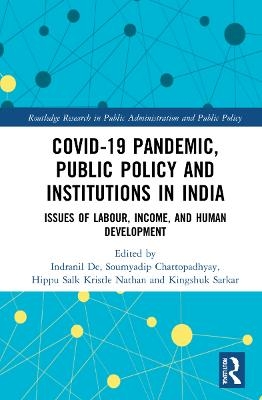
COVID-19 Pandemic, Public Policy, and Institutions in India
Routledge (Verlag)
978-1-032-12947-1 (ISBN)
This book looks at the institutional and governance issues faced by India during the first and second wave of the COVID-19 pandemic and its adverse impact on the vulnerable sectors and groups.
The book is split into four parts, with preceding chapters informing later ones. Part One outlines the approach of the study, in particular their examination of policy responses and the effect of the pandemic. Part Two delves into the governance challenges in containing the pandemic while giving the theoretical rationale for institutional responses. Part Three looks at how the pandemic affected economically vulnerable households, workers, and small industries. The effect of pandemic on the informal sector is also detailed. Lastly, Part Four examines the impacts and responses of Indian public infrastructure and services to the pandemic, in particular the impact of the COVID-19 pandemic on health care and schooling. It also explores the challenges caused by infrastructure inadequacies in Indian cities. The book closes by looking at how businesses in the private sector have responded to the COVID-19 pandemic, with a focus on Corporate Social Responsibility.
The book will be a useful reference to researchers, policymakers, and practitioners who are interested in institutions and development, especially in the context of India.
Indranil De is Associate Professor in Social Sciences and Economics in Institute of Rural Management Anand (IRMA). He holds a PhD from Jawaharlal Nehru University, New Delhi. His areas of interest are institutional economics, political economy, public policy, basic service delivery, housing and gender. He has recently published a book "Social Norms, Gender and Collective Behaviour: Development Paradigms in India" with Palgrave Macmillan. He has published several research articles in reputed journals including Housing studies, Development Policy Review, Water Policy, Journal of Water, Sanitation and Hygiene for Development, International Journal of Social Economics and Economic and Political Weekly. He is Editor of International Journal of Rural Management. He has worked with United Nations Children's Fund (UNICEF), International Water Management Institute (IWMI), Department of Science and Technology – Government of India, Government of West Bengal and National Institute of Rural Development & Panchayati Raj (NIRD&PR) as a researcher or consultant. He was also Member of Expert Committee, National CSR Award 2018 and 2019, Ministry of Corporate Affairs, Government of India. Soumyadip Chattopadhyay teaches at the Department of Economics and Politics, Visva Bharati University. He holds a PhD from University of Calcutta. He was associated with Graduate School of Geography Clark University as a C V Raman Fellow and Department of Urban Studies and Planning University of Sheffield as a Commonwealth Academic Fellow. His research interests lie in the field of development studies and more specifically focuses on urban finance, urban inequality and ongoing transformations in urban governance in Indian cities. His research works have been published in the Progress in Development Studies, Development in Practice, Environment and Urbanization ASIA, Journal of Infrastructure Development, South Asian Survey, Economic and Political Weekly, Journal of Rural Development, Journal of Development Policy and Practice and Review of Market Integration, as well as in other Journals and edited volumes. Hippu Salk Kristle Nathan is an engineer-turned development researcher with an M. Tech. from the Indian Institute of Technology, Delhi, and Ph.D. from Indira Gandhi Institute of Development Research, Mumbai. Currently he works as an Associate Professor at the Institute of Rural Management Anand (IRMA). Prior to joining IRMA, he was with the National Institute of Advanced Studies, Bangalore serving in the Energy Environment Policy Programme. Dr. Nathan has won the Elsevier-National Academy of Sciences, India Young Scientist Award 2017 in Social Sciences. He was the Subir Chowdhury Post-doctoral Fellow at the London School of Economics 2016-17. Dr. Nathan is also one of the winners in the GDN Awards and Medals Competition in the category of Outstanding Research on Development and a recipient of Young Scientist Award conferred at Odisha Environment Congress. Dr. Nathan’s areas of interest lie in energy, economic measurement, sustainable use of resources, human development, and disarmament. Kingshuk Sarkar has mainly worked for Govt. of West Bengal as a Labour Administrator. He is presently visiting faculty at the Goa Institute of Management, Goa. He has PhD in Economics from Jawaharlal Nehru University, New Delhi. His areas of interests are labour economics, industrial relation, labour administration, informal sector labour etc. He has worked as Fellow at the V V Giri National Labour Institute, Noida. He had also worked as Assistant Professor in the National Institute of Rural Development, Hyderabad. He has in his credit number of publications in reputed journals. Attended and conducted numerous conferences, workshops, seminars in India and outside. He has carried out important research assignments in India and abroad and has represented India on global forums on few occasions.
Part 1: COVID-19 Pandemic and Challenges 1. Introduction: the COVID-19 Pandemic, Challenges, and Policy Part 2: Challenges of COVID-19 for Institutions and Governance 2. Policy Response to Pandemic: COVID-19 SOPs and Guidelines 3. The Dichotomies of Management and Governance in the COVID-19 Pandemic: A View from Rawls Difference Principle and Political Economy Perspective Part 3: Impact of COVID-19 on Livelihood and Income of People 4. Some Aspects of Impact of Lockdown in India and the Way Forward 5. Income Shocks and Resilience of Economic Institutions: Role of Collective Organizations 6. Plight of Migrant Informal Workers in India and the Context of COVID-19 and Inadequacy of Existing Labour Legislations 7. MSMEs in India during Lock and Unlock Times: Policy Responses and Coping Strategies 8. The Impact of the COVID-19 Pandemic on Domestic Workers in India Part 4: Infrastructural Challenges and Human Capital 9. Infrastructure Deficits in Indian Cities amid COVID-19: Key Opportunities and Challenges for Policy and Practice 10. Non-COVID-19 Health Care under the Era of COVID-19: A Study from Rural Bengal 11. Impact of Pandemic on School Education in India: Generations at Risk 12. Conspicuous Philanthropy or CSR in times of the COVID-19 Pandemic
| Erscheinungsdatum | 25.03.2022 |
|---|---|
| Reihe/Serie | Routledge Research in Public Administration and Public Policy |
| Zusatzinfo | 23 Tables, black and white; 15 Line drawings, black and white; 4 Halftones, black and white; 19 Illustrations, black and white |
| Verlagsort | London |
| Sprache | englisch |
| Maße | 156 x 234 mm |
| Gewicht | 453 g |
| Themenwelt | Sozialwissenschaften ► Politik / Verwaltung ► Politische Systeme |
| Sozialwissenschaften ► Politik / Verwaltung ► Staat / Verwaltung | |
| Wirtschaft ► Betriebswirtschaft / Management ► Planung / Organisation | |
| Wirtschaft ► Volkswirtschaftslehre | |
| ISBN-10 | 1-032-12947-6 / 1032129476 |
| ISBN-13 | 978-1-032-12947-1 / 9781032129471 |
| Zustand | Neuware |
| Informationen gemäß Produktsicherheitsverordnung (GPSR) | |
| Haben Sie eine Frage zum Produkt? |
aus dem Bereich


